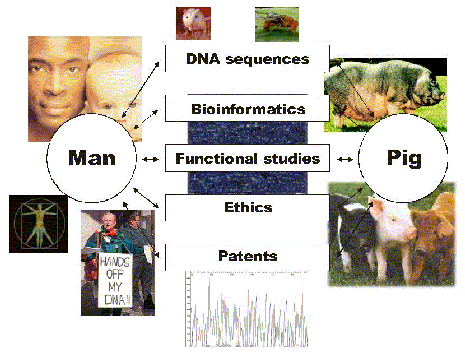 |
Genome Research: A Danish Collaboration |
 |
Genome Research: A Danish Collaboration |
|
|
Comparative genomics focusing on man and pigBackgroundA major inter disciplinary collaboration between several institutions in Denmark has been initiated. The overall goal is to exploit the information that has been/will be generated in regard to the human (and other) genome project(s) and the Sino-Danish pig genome project to obtain knowledge about specific functional aspects of importance to man and pig. This will lead to valuable information both in regard to the interpretation of non-coding sequences, functionality related to species specific genes and knowledge related to species specific restrictions. As an example of the latter; disease causing expansion of tri-nucleotides have been found in man but not in pig. Comparative studies will be exploited specifically in relation to studies of genes that are of importance to cyto-skeletal function and neurodegeneration. Pig models will be established with the aim of studying progressive degenerative diseases. Furthermore, the project will establish a model that can be used for the most rational physical mapping of larger areas of the genome as the sequencing information is accumulated for the pig. This will make possible the efficient cloning of genes that are of importance for animal breeding. Since the research gives rise to considerations concerning ethics and patenting these aspects will be included as an integrated part of the project.

Perspectives We will also focus on activities that will allow the development of pig models that can be used in medical research. This research will proceed from identification of chromosome regions containing candidate genes for important traits to the identification and functional testing of the genes that are responsible for the traits in question. Within this field the research will focus on progressive degenerative diseases. This is an increasing medical problem in the aging human population which is demanding prevention and cure for such disorders. The degenerative processes are to a large extend caused by conformation diseases in which the primary problem is misfolding of proteins. Protein folding is a central function in cells where newly synthesized or unstable proteins have to be protected by helper proteins, chaperones, in order not to adopt erroneous conformations. Misfolded proteins tend to destroy the cells for instance by aggregation. Thus, the proteolytic degradation of misfolded proteins is another central function in the control of protein quality. The problem is aggravated by stress, but the main risk factor seem to be that there are different variants of certain proteins that have a tendency to misfold. Thus, misfolding of proteins is behind prion diseases as for instance Creutzfeld-Jakobs disease and a large number of different inherited and somatic mutations are known to lead to degenerative processes and premature destruction of cells. In the brain different characteristics related both to normal and degenerative processes involved in nerve cell function are of importance for the cytoskeleton. The cytoskeleton is under genetic control and in man mutations affecting these processes have been characterized. However, the degenerative processes and their prevention are difficult to study unless a suitable model system is available. The pig is a relevant animal model in respect to the neurodegenerative diseases due to the fact that the development of the central nervous system is very comparable between man and pig as opposed to for instance man and mouse. It is important to emphasize that most recently it has been shown that, in contrast to rodents, the brain of aging pigs accumulate the neurotoxic protein fragment Ab (I.E. Holm et al., unpublished) which is the most important protein in respect to development of Alzheimers disease. Patent law and ethics Furthermore, general ethical issues arising from the research both in relation to animals and humans will be addressed. I.e., the importance of genetics for the future animal production and the use of animal models for instance in relation to studies of inherited diseases; the use of knowledge about genetically inherited diseases and specifically the ethical problems that are connected to genetic testing of mental diseases and possibly normal traits in man; the impact of comparative genomic research on the perception of man and the status of human beings. Comments, questions, etc., email
webmaster@genome.dk |